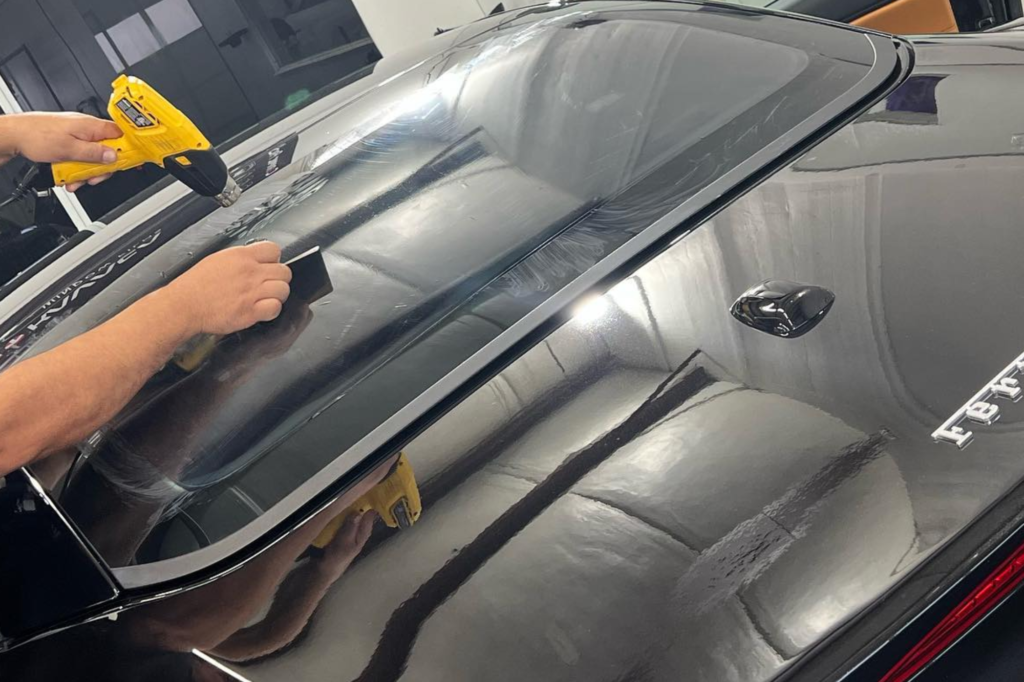When it comes to Tennessee car window tinting laws, consider them the traffic signals of your vehicle’s style. Just like red means stop and green means go, these regulations dictate the acceptable tint darkness levels for different windows of your car. But what happens if you choose to tint outside the legal limits? Well, that’s where things can get a bit tricky. Let’s shed some light on the key facts you should know to stay on the right side of the law and keep cruising smoothly on Tennessee roads.
Key Takeaways
- Front side windows must allow 70% light transmittance, with a maximum of 30% tint darkness.
- Back side and rear windows can have up to 35% tint darkness and must allow at least 35% light transmission.
- Medical exemptions with valid documentation for specific health conditions requiring tinted windows are available.
- Law enforcement actively monitors tint compliance, issuing fines for violations and potentially requiring tint removal.
- Adequate visibility is crucial for safe driving, emergency response, and complying with Tennessee’s window tinting laws.
Legal Tint Percentage in Tennessee
Understanding the legal tint percentage in Tennessee requires being aware of the specific regulations set forth by the state.
In Tennessee, the tint color options for aftermarket vehicle installations are regulated to guarantee safety and compliance with the law. State law mandates that the front side windows and windshield must have a light transmittance of at least 70%. This means that only 30% tint darkness is allowed on these windows.
While the front side windows and windshield have specific requirements, the rear side windows and the back window have more flexibility regarding tint darkness. Tennessee allows for a tint darkness of up to 35% on these windows.
However, it’s vital to guarantee that any aftermarket installations comply with these regulations to avoid potential fines or legal issues.
Understanding the legal tint percentage in Tennessee is important for vehicle owners to guarantee compliance with state laws. By adhering to the regulations regarding tint darkness on different vehicle windows, individuals can enjoy the benefits of window tinting while also maintaining safety on the road.
Front Side Window Tint Rules
Regarding Tennessee’s front-side window tint rules, knowing the legal tint percentage allowed for these windows is essential.
Understanding the exemptions granted for medical reasons is vital, as they may impact your tinting choices.
Additionally, being informed about enforcement practices and potential penalties can help you comply with the regulations effectively.
Legal Tint Percentage
To understand the legal tint percentage for front-side windows in Tennessee, it’s vital to adhere to the state’s specific regulations. Tennessee allows tinting on front side windows, but at least 35% of light must pass through.
This regulation guarantees visibility for drivers and law enforcement officers while providing some benefits of tint technology, such as UV protection and glare reduction. Maintaining the 35% tint percentage on front side windows also contributes to the overall safety of the vehicle occupants.
Following the legal tint percentage not only keeps you compliant with Tennessee laws but also assures that you can enjoy the health benefits of window tinting.
With the right tint percentage, you can reduce the harmful effects of UV rays on your skin and eyes during your daily commute. You can create a comfortable and safe driving environment for yourself and your passengers by striking the right balance between tint darkness and visibility.
Exemptions for Medical Reasons
Given the legal tint percentage requirements for front-side windows in Tennessee, it’s vital to be aware of exemptions that may apply for medical reasons.
Individuals with specific medical conditions that necessitate reduced exposure to sunlight may be eligible for an exemption from the standard tinting regulations. To qualify for this exemption, individuals must provide medical documentation confirming their condition and the need for increased protection from UV rays.
Qualifying conditions for medical exemptions typically include lupus, melanoma, or other dermatological conditions where sunlight exposure can exacerbate symptoms.
Consult with a qualified medical professional to determine if your condition meets the criteria for a medical exemption from the standard tint percentage requirements.
Enforcement and Penalties
In Tennessee, law enforcement authorities diligently enforce front-side window tint rules and strictly monitor regulations to guarantee compliance with the law.
Violating front-side window tint rules can result in penalties such as fines and even the possibility of removing the tint to meet legal requirements.
Law enforcement officers are trained to identify vehicles with window tints exceeding permissible levels. If your vehicle’s front side windows are found to be darker than the allowed tint percentage, you may face consequences.
The penalties for violating front-side window tint rules in Tennessee are designed to uphold safety standards and road visibility. By adhering to these regulations, you avoid potential fines and contribute to your safety and that of others on the road.
Remember to regularly check and guarantee that your window tint complies with the legal limits to avoid any enforcement issues.
Back Side Window Tint Guidelines
Complying with the state’s legal tint percentage is essential for back-side window tint guidelines in Tennessee.
This percentage typically varies for sedans, SUVs, and vans, so check the specific requirements for your vehicle type.
Additionally, visibility requirements must be met to guarantee safe driving conditions for you and other motorists on the road.
Legal Tint Percentage
Understanding the legal tint percentage guidelines is vital for back-side window tinting in Tennessee. Tennessee law allows for a maximum of 35% visible light transmission (VLT), which means that at least 35% of visible light must pass through the tint.
Knowing this percentage is essential to guarantee compliance with the law and avoid potential fines or penalties.
While some may believe that darker tints provide more privacy and better protection from UV rays, it’s important to debunk these tinting myths.
In reality, the 35% VLT regulation balances the benefits of tinting, such as reduced glare and heat absorption and maintaining visibility for safe driving.
Visibility Requirements
Consider the importance of maintaining adequate visibility while adhering to Tennessee’s back-side window tint guidelines.
In Tennessee, the tint visibility standards mandate that back-side windows allow at least 35% of light to pass through. This regulation guarantees drivers clear visibility daily and nightly, promoting road safety for all motorists.
Following these tint visibility standards is essential for several safety considerations. Adequate visibility through backside windows gives drivers a clear view of their surroundings, reducing the risk of accidents, especially when quick decisions are necessary.
Furthermore, emergency responders and law enforcement officers need visibility into vehicles for safety and effective communication during traffic stops or emergencies.
Rear Window Tint Restrictions
Tennessee law mandates specific restrictions on the level of tint allowed on vehicles’ rear windows. When considering rear window tinting, it is vital to balance its benefits with potential visibility concerns.
Rear window tinting can increase passenger privacy and protect the vehicle’s interior from sun damage. However, excessive darkness in the rear window can obstruct the driver’s view from inside the car, especially at night or in low-light conditions. This limitation can compromise safety on the road, as it may hinder the driver’s ability to see objects or vehicles approaching from behind.
To address these concerns, Tennessee’s regulations stipulate that the rear window tint should allow at least 35% of light to pass through. This guarantees that drivers have adequate visibility while still benefiting from some level of tinting. By adhering to this standard, drivers can balance the advantages of rear window tinting and the necessity of clear visibility, promoting safer driving conditions for themselves and others on the road.
Vehicle owners must comply with these regulations to avoid potential fines or legal issues related to tinted windows. Understanding and following Tennessee’s rear window tint restrictions contributes to safer roads and a more secure driving environment for everyone.
Reflectivity Requirements for Tint
When it comes to Tennessee’s car window tinting laws, understanding the reflectivity requirements for tinting is vital.
Tennessee limits how reflective window tint can be, ensuring compliance with regulations.
It’s important to be aware of these reflectivity limits when tinting your car windows in Tennessee to avoid potential legal issues.
Reflectivity Limits in TN
About the regulations on car window tinting in Tennessee, it’s crucial to be aware of the state’s specific restrictions concerning the reflectivity of tinted windows.
Tennessee law dictates that the front side windows must allow over 35% light transmittance, while the back side and rear windows can have any level of darkness for tinting, but they mustn’t be more reflective than a standard window.
When choosing tint color options, remember that reflective tints are generally not allowed on vehicles in Tennessee.
This means opting for non-reflective tint films will guarantee compliance with the state regulations.
During installation, confirm that the applied tint film doesn’t exceed the specified reflectivity limits to avoid legal issues.
Compliance With Regulations
Understanding and adhering to the specific requirements set forth by Tennessee’s window tinting regulations regarding reflectivity is vital to guaranteeing compliance.
Regarding the reflectivity of window tint, Tennessee law dictates that the front side windows must allow more than 35% of light to pass through, while the back side windows, rear windows, and sunroofs can have any darkness of tint.
To stay within the legal limits, it’s essential to choose tinting materials that comply with these guidelines.
When selecting window tint, review the installation guidelines provided by the manufacturer.
Proper installation is critical to maintaining the correct level of reflectivity.
Confirm that the tint is applied evenly without any bubbles or imperfections, which could affect its ability to meet the state’s regulations.
Medical Exemptions for Tinting
Tennessee car window tinting laws provide provisions for medical exemptions for individuals with specific medical conditions requiring protection from sunlight. If you have a medical condition requiring tinted windows for health benefits, you can apply for an exemption.
Here are some key points to take into account regarding medical exemptions for window tinting in Tennessee:
- Medical Documentation: You’ll need to provide valid medical documentation from a licensed physician outlining your condition and the necessity for window tinting to alleviate symptoms or prevent further health issues.
- Exemption Application Process: Applying for a medical exemption typically involves submitting the required medical documentation to the appropriate authorities for review. To expedite the process, ensure that all necessary paperwork is completed accurately.
- Approval Considerations: Authorities will evaluate each medical exemption request on a case-by-case basis to determine if the condition meets the criteria for window tinting exemption under Tennessee law. Be prepared to provide any additional information or attend an evaluation if requested.
Law Enforcement Considerations
Evaluating the implications of Tennessee’s car window tinting laws on law enforcement operations is vital for ensuring compliance and public safety.
Law enforcement officers face various enforcement challenges when dealing with tinted windows. The darkness of window tints can obstruct visibility into the vehicle, making it difficult for officers to assess the situation inside during traffic stops. This limitation poses a safety risk for officers, who might not know what they might encounter as they approach vehicles.
Officer discretion plays a vital role in addressing these challenges. While Tennessee law specifies the legal limits for window tint darkness, officers must use their judgment when determining if a vehicle’s window tint complies with the regulations. This discretion allows officers to weigh factors such as lighting conditions, the driver’s behavior, and the need for clear visibility into the vehicle for safety reasons.
Enforcement challenges arise when drivers attempt to push the limits of tint darkness or ignore the regulations altogether. This can lead to confrontations between officers and drivers, potentially escalating situations unnecessarily.
In such cases, officers must balance enforcing the law, maintaining public safety, and diffusing tensions during interactions with non-compliant individuals.
Penalties for Tint Violations
When drivers violate Tennessee’s car window tinting laws, they may face penalties that vary depending on the severity of the violation. The consequences of tint violations in Tennessee can range from fines to more severe legal repercussions. Understanding these penalties is important to guarantee compliance with the state’s regulations.
- Fines: Drivers with excessively tinted windows may be subject to penalties. The amount of the fine can vary based on factors such as the degree of tint darkness and whether it’s a first-time or repeat offense.
- Window Inspection: In some cases, drivers with tinted windows that violate Tennessee’s laws may be required to have their windows inspected by law enforcement. This inspection may involve measuring the tint darkness to determine if it complies with the legal limits.
- Window Tint Removal: In more severe cases of tint violations, drivers may be required to remove the tint from their windows entirely. Failure to comply with this requirement can lead to further legal consequences.
Understanding the potential penalties for tint violations in Tennessee is vital for all drivers to guarantee they follow the state’s regulations and avoid unnecessary fines or legal issues.
Inspection and Enforcement Procedures
Periodically, law enforcement agencies in Tennessee conduct inspections to uphold the state’s car window tinting laws. During tint inspections, officers may use specialized tools to measure the darkness of the tint on vehicle windows. If a vehicle is found to have a tint that exceeds the legal limits, the driver may be issued a citation and required to remove or replace the tint to comply with regulations.
Enforcement procedures for tint violations in Tennessee are taken seriously to promote road safety and compliance with state laws. Officers may conduct random tint inspections at checkpoints or during routine traffic stops.
Additionally, individuals who’ve received tint violation citations may be required to present their vehicle for inspection within a specified timeframe to verify compliance with tinting regulations.
Failure to address tint violations can result in increased fines or potential legal consequences. Drivers must be aware of the state’s tinting laws and guarantee their vehicles adhere to the specified regulations to avoid penalties.
Resources for Tinting Information
To stay informed and compliant with Tennessee’s car window tinting laws, drivers need access to accurate and reliable resources for tinting information.
Understanding the legal guidelines and staying updated on any changes is essential to avoid potential fines or penalties. Here are some valuable resources that can help you navigate Tennessee’s car window tinting laws effectively:
- Tennessee Department of Safety and Homeland Security Website: Visit the Tennessee Department of Safety and Homeland Security website to find detailed information on car window tinting regulations. This resource provides access to current laws and guidelines regarding acceptable tint levels and requirements.
- Local Law Enforcement Offices: Contact your local law enforcement offices for specific questions regarding car window tinting laws in your area. They can offer insights into local ordinances or regulations that may differ from statewide guidelines.
- Professional Tinting Shops: Consult with reputable auto tinting shops in Tennessee for expert advice on window tinting options that comply with state laws. These professionals can guide you in selecting the correct tint levels and guarantee proper installation to meet legal requirements. If you’re searching for “car window tint near me,” consider visiting trusted tinting shops like Ceramic Pro Knoxville for high-quality, compliant tinting services.
To Sum Up
In Tennessee, car window tinting laws are clear-cut and strictly enforced. Like a well-oiled machine, the regulations guarantee that drivers can see clearly while maintaining privacy. Remember, exceeding the legal tint percentages can result in fines and removal of illegal tint. So, make sure your windows comply to avoid getting caught in the glare of law enforcement. Drive safe, stay legal, and enjoy the ride! For professional and compliant tinting services, trust Ceramic Pro Knoxville to deliver the perfect balance of privacy and visibility.





